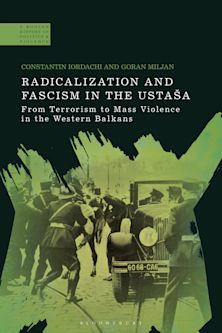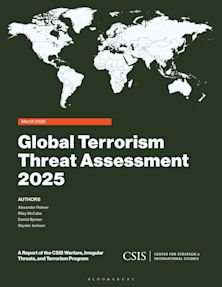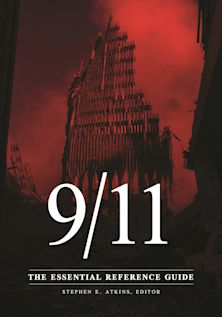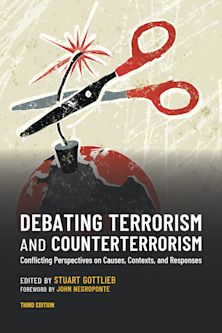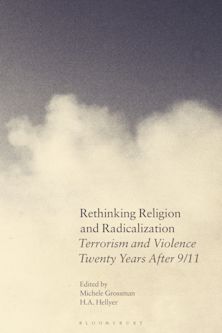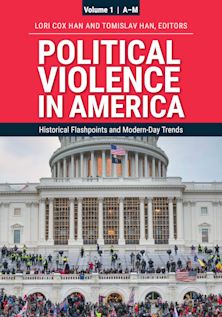- Home
- ACADEMIC
- Politics & International Relations
- Terrorism and Political Violence
- America's 'War on Terrorism'
America's 'War on Terrorism'
New Dimensions in U.S. Government and National Security
John E. Owens (Anthology Editor) , John W. Dumbrell (Anthology Editor) , Richard S. Conley (Contributor) , Saki Ruth Dockrill (Contributor) , Tim Dunne (Contributor) , Richard Lock-Pullan (Contributor) , James M. McCormick (Contributor) , Mark Phythian (Contributor) , Gareth Stansfield (Contributor)
America's 'War on Terrorism'
New Dimensions in U.S. Government and National Security
John E. Owens (Anthology Editor) , John W. Dumbrell (Anthology Editor) , Richard S. Conley (Contributor) , Saki Ruth Dockrill (Contributor) , Tim Dunne (Contributor) , Richard Lock-Pullan (Contributor) , James M. McCormick (Contributor) , Mark Phythian (Contributor) , Gareth Stansfield (Contributor)
You must sign in to add this item to your wishlist. Please sign in or create an account
Description
How has 9/11 and George W. Bush's self-declared "war" on terror changed American government and US foreign policy? This is the central question addressed in the nine original essays in this book. Following an introduction by the editors, in which they survey issues and debates raised by America's "War" on Terrorism and its consequences for US government and politics, foreign policy, and for American foreign relations, the contributions to this volume-from British and American scholars-explain the implications of the post-9/11 mobilization and reconfiguration of US foreign and internal security policies.
Issues addressed in the book include: the growth of presidential power, executive branch reconfiguration and the managerial presidency, the Bush doctrine of pre-emption, the changing role of the US in the international order, the impact of the "war" on terrorism on the US military, intelligence failure and the changed role of US intelligence, renewed tension in US-European relations, and Bush's alliance with Tony Blair's government in the United Kingdom. Taken together, the essays represent an original and timely assessment of the domestic and international repercussions of George W. Bush's responses to the terrorist attacks September 11, 2001.
Table of Contents
Chapter 2 Introduction: New Dimensions in the United States Government and National Security
Chapter 3 1Presidential Aggrandizement and Congressional Acquiescence in the "War on Terrorism": A New Constitutional Equilibrium?
Chapter 4 2 Reform, Reorganization, and the Renaissance of the Managerial Presidency? The Impact of 9/11 on the Executive Establishment
Chapter 5 3 Dealing With Fear: Implementing the Bush Doctrine of Preemptve Attack
Chapter 6 4 Realist and Reflectivist Perspectives on International Relations and the US "War on Terror"
Chapter 7 5 US Military Strategy, Strategic Culture, and the "War on Terror"
Chapter 8 6 Locating Failure? US Pre-War Intelligence on Iraq's Weapons of Mass Destruction
Chapter 9 7 The War on Terror and Contemporary US-European Relations
Chapter 10 8 Working with Allies: US-UK Relations, the Iraq Invasion, and the Future of the "Special Relationship"
Product details
| Published | 01 Jan 1955 |
|---|---|
| Format | Ebook (Epub & Mobi) |
| Edition | 1st |
| Extent | 270 |
| ISBN | 9780739130254 |
| Imprint | Lexington Books |
| Publisher | Bloomsbury Publishing |
About the contributors
Reviews
-
Now that the reality of 9/11 has sunk in, this group of U.S. and European scholars puts the fallout and blowback of the terrorist attacks into perspective. From the implications of 9/11 for separation of powers in the United States, to the international ramifications for alliance politics, these insightful essays place the U.S. war on terror into theoretical and historical perspective. Students and scholars alike will benefit from these excellent analyses.
James P. Pfiffner, George Mason University
-
This is an excellent resource for anyone interested in probing the political and policy consequences of the U.S. war on terrorism. Owens and Dumbrell are to be commended for bringing together a capable group of seasoned scholars to create a provocative and highly insightful collection of essays. One of the volume's clear strengths is its theoretical and substantive breadth. An impressive array of actors, policy tools, and conceptual approaches are covered within a relatively short amount of space.
Christopher M. Jones, Northern Illinois University
-
Since the September 11 attacks, the 'global war on terrorism' has cast a large shadow on American foreign policy. President Bush has frequently linked a wide range of American actions-notably but not exclusively in Iraq-to the GWOT. This timely collection of incisive essays touches upon such important issues as the growth of unilateral and discretionary presidential powers, the distinction between preemptive and preventive war, intelligence failures, alliance relations, and many others. It is thus essential reading, all the more so because we are entering the 2008 election season.
Ole R. Holsti, Duke University












